« March 2010 | Main | May 2010 »
April 29, 2010
Miyamoto Musashi

Tomu Uchida - 1961
AnimEigo Region 1 DVD
I first came across the name of Tomu Uchida in 1975. This was in Paul Schrader's essay on yakuza films published in "Film Comment". One of Uchida's earlier films, Theater of Life had been cited as key in the development of the yakuza genre. Uchida is a relatively unknown filmmaker, with the five DVDs in the Miyamoto Mushashi series serving as an introduction to a man whose career spanned from the silent era through the collapse of Japan's studio system. The character has been the subject of a trilogy by Hiroshi Inagaki which I saw several years ago. Perhaps not so coincidentally, Rentaro Mikuni, who appeared in the first film of Inagaki's trilogy, has the recurring role of a Buddhist priest in Uchida's series. How Uchida retells a familiar story is what makes a difference.
This first film begins immediately with two low level sumurai groveling in the mud. They have been on the losing side of the decisive battle that initiated the Shogun rule in Japan. At least in this film, if Uchida resembles any other filmmaker, it is Delmer Daves. in the use of the environment, of having his characters lives tied, sometimes literally, with the natural world. There are several shots of the characters completely dwarfed by the surrounding landscape. In one shot, it takes almost a minute to realize that what is being viewed is not a static shot of a mountain, but Kinnosuke Nakamura making his way through a trail, virtually imperceptible until he arrives near the base.

Uchida could well have been reacting to some of the taboo shattering of the younger directors who emerged at about the time this film was made. That is not the traditional samurai movie is made clear when the star is seen wearing little more than his fundoshi. While not depicting sex, the scene of a woman sucking out the poison from the dirty leg of one of the samurai is unmistakably sexual. There is a vampiric lust in the face of Michiyo Kogure, with specks of blood on her teeth. It is later revealed that she has adopted the young samurai that she has rescued as her son, but what is indicated in their scenes together is that her feelings are more than motherly.
Uchida uses light simply, but effectively. This first film is about Miyamoto Musashi's self realization regarding the ineffectiveness of anger and general disregard of the lives of others. In a scene where he first meets the priest, Takuan, Rentaro Mikuni's face is lit, while Kinnosuke Nakamura is barely visible in the darkness of night. A fundamental sense of enlightenment is given a visual presentation through the use of a close up of Nakamura, increasingly visible with sunlight. It's literal filmmaking, yet Uchida is smart enough not to use the kind of musical accompaniment that would push this part of the film to an overemphasis in the style of Cecil B. DeMille.

Posted by Peter Nellhaus at 12:33 AM | Comments (3)
April 27, 2010
Accuracy of Death

Suwito rein: Shinigami no seido/Sweet Rain
Masaya Kakei - 2008
Innoform Media Region 3 DVD
The reaper in this film is not particularly grim, nor is he feared. In this case, death comes in the form of Mr. Chiba, who shows up to decide if the designated person is to die unexpectedly. He wears while gloves to prevent the living from expiring by an accidental touch. There are bargains to be made, though nothing as symbolic as a chess game. When Mr. Chiba shows up, it is constantly raining.
The film is comprises of three episodes, of Mr. Chiba with a young office girl who feels her life is not worth living, a young man who dedicates his life to the gangster who has taken care of him since childhood, and an older woman who operates her one chair barbershop in her little house by the sea. Mr. Chiba is accompanied by a dog, a black retriever, whom exchanges thoughts with him telepathically. Mr. Chiba has his own idiosyncrasies such as wanting to listen to music, "humanities greatest invention", every chance he gets, while displaying an inability fully understand colloquial speech.

This is the kind of film that works in spite of the set up, even though it is never explained by Mr. Chiba is accompanied by the dog. What does work is the limited use of special effects, giving the film something a a visual equivalent to magic realism, such as the flower that wilts in Mr. Chiba's hand, the background outside a coffee shop that morphs into a flashback of the office girl, and the gathering of crows that show up when Mr. Chiba is around. The unusual element in the story, such as the several grim reapers who show up with their gloved hands, are treated either with light humor, or simply as matter of fact. The one part that doesn't work, at least for me, is a yakuza gun battle while "Silent Night" is on the soundtrack. Aside from not being clear about the intention here, although there are some Christmas decorations spotted in the background, the scene struck me as a reworking of a similar scene in John Woo's Face/Off with guns blazing to the song, "Somewhere, Over the Rainbow".
Mr. Chiba determines life or death for the people he spends a few days with based on whether they have fulfilled their purpose in life. It's a plot point that some might feel is severely underemphasised, which is to say, how is a fulfilled life determined, and who is entitled to make that decision? The original Japanese title translates as "The precision of the agent of death". What makes Mr. Chiba odd within the context of what he does, is his lack of understanding regarding the impact of his job, a point presented at the beginning of the film when he is sitting next to a young girl, who it is later revealed, is the one being mourned at a funeral.
Having Takeshi Kaneshiro as the grim reaper has quite easily reminded some viewers of this film of Brad Pitt's similar turn in Meet Joe Black due to his youthful appearance. Certainly the role is lighter, and more comic at moments, than turns in such films as Red Cliff. The Warlords, or House of Flying Daggers. For myself, the real treat to watching this film was seeing Sumiko (Junko) Fuji as the woman barber, living alone in an unspecified future, with her robot companion. Still attractive in her maturity, though not artificially so, Fuji was the top female star in Japanese films in the !960s through early Seventies. Even though she is not wielding a short sword, or showing off her skill in card games, Fuji still gets the winning hand at the end.

Posted by Peter Nellhaus at 12:38 AM
April 25, 2010
Coffee Break

Christine Larson and Richard Rober in The Well (Leo Popkin and Russell Rouse - 1951)
Posted by Peter Nellhaus at 12:12 AM
April 22, 2010
Floating Clouds

Ukigumo
Mikio Naruse - 1955
B.F.I. Region 2 DVD
I wanted to see Floating Clouds in part because I felt like seeing another Mikio Naruse film as soon as possible. Also, fellow blogger Iain Stott, compiled a list of 225 films that felt needed more critical attention, and I had a some gaps to fill. Cutting that list down to size was a bit of work, including tossing out titles of films that I really love. I'm not as fond as others regarding the creation of lists, but there are some movies that need some more attention. I will see again When a Woman Ascends the Stairs as soon as possible.
A second thought that is connected to Iain Stott's list is that some of the films are listed either with their original language, and in some cases, the British release title. More importantly, some of the films, particularly those by Kenji Mizoguchi, are not available as Region 1 DVDs. I bring up this point because every once in a while, I will read someone, or hear someone say, that a movie is not available on DVD. Usually what they mean is that the film in question is not available on a Region 1 DVD. Maybe someone will call me on this, but my attitude is, if you're a serious cinephile, you should own a DVD player that is region free. Buying the DVDs is another matter, although there are some outlets that rent imported DVDs. In my case, the player I have was bought from Amazon, under fifty dollars, and Amazon even had the hack code on their website, thereby enabling me to see some other films by Mikio Naruse, rather than hope and pray that Criterion will come to the rescue.

And while Floating Clouds is not a favorite of the Naruse films seen to date, Hideko Takamine is positively luminous in the white dress, seen in the first flashback. The movie is based on the writings of Fumiko Hayashi. Takamine plays the part of a youngish woman in love with a man hardly deserving of her devotion. The film takes place initially in 1946, with Takamine's character, Yukiko, returning to Japan from what was then French Indo-China. Nothing is said about her life between the time that Japan was defeated and when we see Yukiko taking her first steps in post war Tokyo. The two, Yukiko and Kengo, met while working for Japan's agricultural department, in what is now the Vietnamese city of Da Lat. One of the men pointedly mentions that the work strictly deals with forestry, an indirect way of acknowledging that whatever they are doing on behalf of the government is not combat related. Kengo is married, yet he and Yukiko have an affair during the time they are working together. Yukiko hopes to renew the relationship with Kengo, only to find herself in one bad situation after another.
On a broader scale, Floating Clouds is about desperate times in Japan in the first years following the war. Yukiko lives in a storage room. Unable to get a job, she is temporarily supported by an American soldier, a small step up from being a bar hostess or prostitute. Even when she goes to a small resort inn with Kengo, her lover has his eye on the innkeeper's wife, initiating an affair while still with Yukiko. Finding no other viable way of supporting herself, Yukiko takes up with her sleazy brother-in-law, now the head priest of a newly created religion devoted to the Sun God. Even with a nice house and clothing, Yukiko still pines for Kengo, no matter that the guy remains married, or has yet another mistress or two.
In this story of "l'amour fou", Naruse recounts Yukiko and Kengo's relationship in Da Lat in a series of flashbacks. What is unusual is that these flashback are all done as straight cuts from the present, eschewing dissolves or any other device. This might be explained by Yukiko's emotional state, that the past is what propels her, what keeps her alive in the present. What the audience sees is not simply a look back at events of a few years ago, but what Yukiko sees in her mind's eye now. The editing of the flashbacks is not simply radical for Naruse, but is something that generally wasn't found in commercial movies of the time, anywhere. What is consistent with Naruse's other films are the traveling shots when two lovers are walking, the use of framing devices in several shots, and compositions of shots that would be repeated in other films. As for Hideko Takamine, even when she's lying on her back, sick from a cold, croaking her lines, she has never looked as beautiful as she does in Floating Clouds.
Posted by Peter Nellhaus at 12:19 AM
April 20, 2010
House
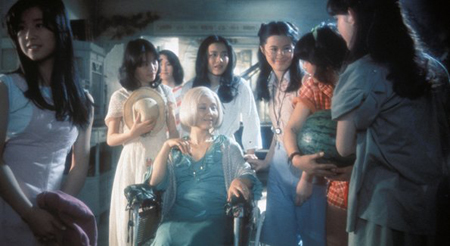
Hausu
Nobuhiko Obayashi - 1977
Janus Films 35mm film
Mentioned first by the Denver Post's Lisa Kennedy, and again by Keith Garcia of the Denver Film Society is that House was released in the same year as Dario Argento's Suspiria. Both are horror films about young women trapped by supernatural forces beyond their understanding. What also ties the films is that the stories are rooted in a dream logic that needs to be met on its own terms to be appreciated, if not necessarily understood. In both films, that dreamlike quality starts at the beginning, in Suspiria when Jessica Harper walks out of the airport to a gust of wind, and in Hausu during the scene introducing the high school girls as comic characters with names like Gorgeous, Kung Fu, Prof, Melody and Mac.
The house of the title belongs to Gorgeous's aunt, unseen for ten years. Yet even before that journey, the film exists in an idiosyncratic universe. Gorgeous's bedroom at home is decorated by a pattern of oversized flowers that are unnerving. This is also an environment informed by movies, with Gorgeous's father writing music for Sergio Leone, pointedly artificial exteriors, black and white flashbacks that appear to have made use of some older Toho movies, a moment when the movie appears to burn in the projector, and the projection of a red movie frame. The woman who is to be Gorgeous's stepmother is introduced with her scarf waving in the slow motion wind. Well before we get to the house, House establishes itself as taking place in another world with only a tangential relationship to our sense of reality.

Is there anyone who doesn't know the basic premise of House by now? For anyone who missed it, six high school girls, their original plan for a summer excursion cancelled, join with another girl, Gorgeous, who has decided to reconnect with her aunt. Gorgeous's motivation is nostalgia for her late mother, brought to the forefront with her father's announcement that after eight years, he plans to marry again. The letter from the aunt inviting Gorgeous to come visit coincides with the appearance of a white cat on the mail box. Gorgeous, her friends, and the fluffy white cat all visit the aunt's house, in a very remote location in the country.
Even though House was produced by Toho, I am convinced that Obayashi was doing his own version of a Shin Toho horror film. Glimpses of films by Nobuo Nakagawa on Youtube have me certain that Obayashi was reworking bits from such films as The Lady Vampire and Black Cat Mansion. House could well have been titled "White Cat Mansion". Some of the special effects and artifice are as wonderfully cheesy as might by found in the space operas directed by Shin Toho's other top house director Teruo Ishii. It's a supposition on my part. Yet, looking at the obviousness of the special effects, especially the piano that eats Melody, is part of a deliberate design. Rather than attempting to create special effects that are meant to be accepted at face value as realistic, and do it badly, Obayashi has taken the opposite tack of not trying to appear realistic with the superimposed animation and color. A more conventional filmmaker would try to make make the unreal look real within the confines of a low budget, and hope that the audience doesn't feel too cheated. Obayashi has chosen to have fun with the obvious fakery with the goal that the audience will go along with the gag.
Beyond what interests Obayashi has in the genre of the fantastic, House also incorporates seemingly disparate styles from his previous work. Primarily working as the extremely prolific maker of television commercials, Obayashi also would make experimental films for over fifteen years. Some of the foolery consists of the kind of sight gags found first in silent comedies, such as the prone body of a male teacher falling head first down a flight of stairs through frame by frame cinematography. There is also the fact that House marked the beginning of Obayashi's career in commercial, narrative filmmaking, a career that is in serious need of greater evaluation.
While the story is credited to Obayashi's then young daughter, the screenplay was one of the first by Chiho Katsura, whose next job was collaborating with Kon Ichikawa. For myself, the real star of House is Yoko Minamida. It is fitting that her last screen performance was again with the director of what may become her best known role. Even those who might not remember her name will be unable to forget the woman with the eye that peers out of her mouth.
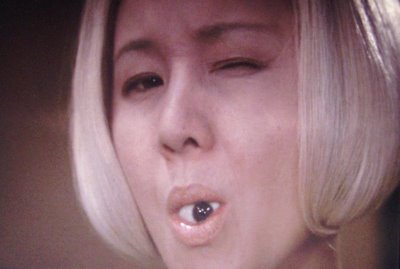
Posted by Peter Nellhaus at 12:33 AM
April 18, 2010
Coffee Break

Dennis Hopper in The Young Land (Ted Tetzlaff - 1959)
Posted by Peter Nellhaus at 12:22 AM
April 15, 2010
My answers to PROFESSOR FATE'S SPRING-LOADED GREAT-RACING SPRING BREAK MOVIE QUIZ
It's that time again for another quiz originally posted at Sergio Leone & The Infield Fly Rule. My posting my answers here is for the amusement of any readers who like smart aleck remarks in between a couple of relatively serious answers. All I can do is hope that Professor Fate grades on a curve.
1) William Demarest or Broderick Crawford?
Demarest wins because of his association with Preston Sturges, plus he provided the voice of Wally Walrus.
2) What movies improve when seen in a state of altered consciousness? (Patrick Robbins)
Dr. Zhivago moved along quite nicely while I was sipping rum and coke in the theater.
3) Favorite studio or production company logo?
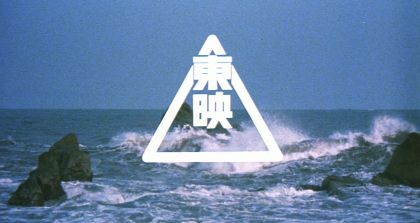
The waves on the rocky beach of Toei.
4) Celeste Holm or Joan Blondell?
As much as I like Ms. Holm when she's working with Joe Mankiewicz, I always enjoy Blondell in any Warner Brothers film she's in.
5) What is the most overrated "classic" film? (Tony Dayoub)
I have never been able to watch William Wyler's Ben-Hur from beginning to end.
6) What movie do you know for sure you saw, but have no memory of seeing? (Patricia Yokoe Cozzalio)
I can never remember which Ozu films I saw with the seasonal titles.
7) Favorite Hammer Film?

Brides of Dracula.
8) Gregory Itzin or Joe Pantoliano?
Joey Pants, for "The Sopranos", Momento, and his work with the Wachowskis.
9) Create a double feature with two different movies with the same title. No remakes. (Peter Nellhaus)
At the drive-in: The Mask, by Julian Roffman and Chuck Russell.
At the art house: Woman on the Beach, by Jean Renoir and Hong Sang-soo
10) Akiko Wakabayashi or Mie Hama? (Ray Young)
Did you know that when these two were Toho starlets, they appeared in seven films together? I wonder if there was a bond between them aside from You Only Live Twice. They are also in Key of Keys, the spy thriller that Woody Allen dubbed as What's Up, Tiger Lily?. And Allen, as you know later played Jimmy Bond. I would like to see them with Toshiro Mifune in Samurai Pirate only because that title is so cool. Mie Hama plays Princess Yaya which seems very appropriate, and in King Kong Escapes plays Madame Piranha. And though Ms. Wakabayashi is quite cute, Mie Hama was good enough to be in a couple of late films by Mikio Naruse, so it's Hama time.
11) Can you think of a (non-porn) movie that informed you of the existence of a sexual act you had not known of prior? (Bob Westal)
No. But Mountain of the Cannibal God showed me more than I will ever want to see regarding, shall we say, animal husbandry.
12) Can you think of a black & white movie that might actually improve if it was in color? (Patrick Robbins)
Walsh's The Big Trail.
13) Favorite Pedro Almodovar Film?
Talk to Her.
14) Kurt Raab or Udo Kier?
Raab, because of the Fassbinder films. Can you read the title, Die Niklashauser Fart and not laugh even a little?
15) Worst main title song (Peter Nellhaus)
I was going to nominated the song from Sea Wife. However that song is titled, "I'll Find You". Bobby Troup's song for Allan Dwan's The River's Edge is pretty dopey.
16) Last movie you saw in a theater? On DVD, Blu-ray or other interesting location/format?
In a theater, Flowing by Mikio Naruse. On DVD, The Young Land starring the young Dennis Hopper.
17) Favorite movie reference within a Woody Allen movie? (Larry Aydlette)
The chess game in Love and Death.
18) Mary Astor or Claudette Colbert?
To answer a previous question, I know I saw them both in Midnight, but I can't remember anything about that film. I have to go with Colbert in part based on the number of films she was in, although I have one film from each in my DVD collection. One's about a bus ride, and the other is about a bird.
19) Favorite trailer (provide YouTube link if possible)?
Even in Japan, they shoot westerns.
20) Oddest double bill you either saw or saw listed in a theater
Richard Lester's Help! and Burt Kennedy's The Rounders might be one of the odder pairings, though I like them both.
21) Favoite Phil Karlson film?

Hell to Eternity.
22) Favorite “social problem” picture?
Several films by Sam Fuller come to mind, but I'll go with The Naked Kiss.
23) Your favourite Harryhausen film/monster? (Ali Arikan)
Sword fighting skeletons rule! Jason and the Argonauts.
24) What was the first movie you saw with your significant other? (Patrick Robbins)
There is no S.O. in my life at this time, and I will leave it at that.
25) John Payne or Ronald Reagan?
I prefer Tennessee to Tennessee's partner. (Payne).
26) Movie you feel a certain pressure or obligation to see that you have not yet actually seen
The Blind Side.
27) Favorite “psychedelic” movie (Hey, man, like, define it however you want, man…)
Barbet Schroeder's More. Pink Floyd and Mimsy Farmer!
28) Thelma Ritter or Eve Arden?
It's all about Eve.
29) Favorite iconic shot or image from a film?
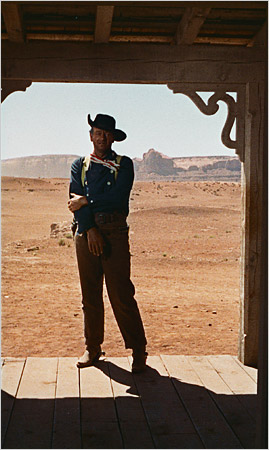
Another obvious choice - John Wayne in the doorway in The Searchers.
30) What is the movie that inspired the most memorable argument you ever had about a movie?
College, way back when: I was arguing with friend of a sort of girlfriend regarding Citizen Kane, which we had just seen on TV. He was saying he couldn't "get into it". The young lady tried to stop the argument by saying, "It's only a movie". I stopped seeing her after that.
31) Raquel Torres or Lupe Velez?
The artist formerly known as Margarita Carmen Cansino.
32) Favorite adaptation of Shakespeare to a film?
Throne of Blood. All those arrows.
33) Andy Warhol's Frankenstein (in 3D)-- yes or no?
Unseen.
34) Favorite movie rating?

I miss the old "M" rating, and the kinds of film that were covered then that are now rated "R" by those prudes at the MPAA.
35) Olivia Barash or Joyce Hyser?
Why should I care when there Yu Aoi?
36) What was the movie that convinced you your favorite movie genre was your favorite movie genre?
I'm not sure if I have one favorite genre, but seeing The Big Combo back around 1971 might have been the film to help cement my love of classic film noir.
37) Favorite Blake Edwards movie?
It's been years since I've seen anything by him, but the one I'd most want to revisit is Gunn.
Posted by Peter Nellhaus at 12:33 AM | Comments (1)
April 13, 2010
Lightning
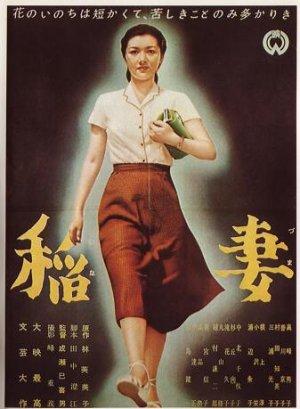
Inazuma
Mikio Naruse - 1952
Daiei Studios 35mm film
The day before I saw Lightning, I viewed the DVD of Late Chrysanthemums. The films are similar in that there is no dramatic arc as in a film like Yearning. Mikio Naruse has instead chosen to present a slice of life as it were, about the lives of women in Japan following World War II.
What is stated by one of the women in Lightning is how the loss of lives, of Japanese soldiers, in turn caused chaos in the traditional social fabric following the war. Late Chrysanthemums is about older women, former geisha, who resort to various ways of surviving without the male patronage that they had previously depended upon. The three sisters in Lightning are younger, but only one of them heeds the lessons by observing her siblings.
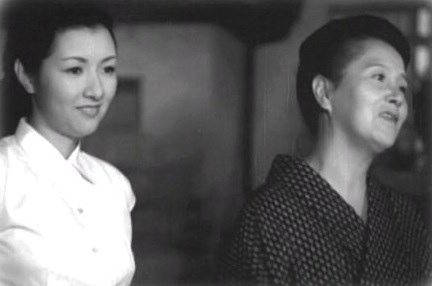
Hideko Takimine plays the youngest daughter, Kiyoko, of the most dysfunctional family in Japan. She and her two sisters and one brother have the same mother, but each had a different father. The fathers are all presumably dead, and the brother is of no help to the family, using the war as an excuse to keep from finding a job. With one exception, the men in Lightining are either emotionally weak, or lacking in scruples. The eldest sister, Nuiko, attempts to set Kiyoko up with the relatively prosperous Goto. The owner of a bakery, at a time when food was still scarce, with investments in other businesses, Goto is also coarse, and not very attractive. The married Nuiko flirts openly with Goto, and soon are soon openly living together, causing more pain for Nuiko's alcoholic husband. Goto helps the middle sister, Mitsuko, set up a small coffee house, and has set up house with her as well. Mitsuko's husband has died, leaving behind a secret mistress with a child, and an insurance policy that the family squabbles over even while its existence is doubtful. Given this view of family life, Kiyoko flees to a small rented room in a quiet area away from Tokyo.
Kiyoko is first presented to the audience in the course of her work as a tour guide on a bus, showing the sites of Tokyo. Unlike her sisters or mother, Kiyoko is independent of marriage or male patronage. In her new home, though, it is suggested she might get together with the boy next door, a handsome, and more reliable type, who lives with his sister, plays Chopin on the piano, and does his own laundry. Like Repast, Lightning is also taken from the writings of Fumiko Hayashi.
There is one memorable scene which harkens back to Naruse's roots in comedy. The old widow who rents her available room to Kiyoko invites her new tenant to share in some noodles. The widow comments on how her husband liked her unique recipe. Kiyoko pulls out some noodles with her chopsticks. The noodle strands are impossibly longs, seemingly endless. Mikio Naruse was observant of human foibles, but long after his time with silent comedy, he still had an eye for a visual gag.
Posted by Peter Nellhaus at 12:44 AM
April 11, 2010
Coffee Break

Eve Arden in One Touch of Venus (William A. Seiter - 1948)
Posted by Peter Nellhaus at 12:00 AM
April 10, 2010
Yearning
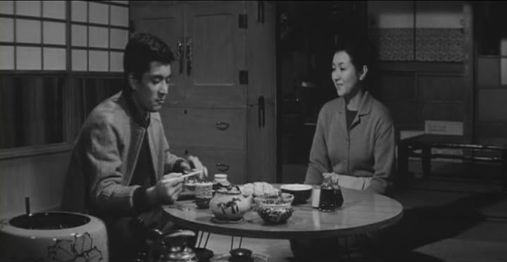
Midareru
Mikio Naruse - 1964
Toho Company 35mm film
In her study on the films of Mikio Naruse, Catherine Russell mentions Douglas Sirk a few times, primarily in discussion of the use of melodrama as social commentary, but also to provide academic validation for the discussion of the genre. Some of what Russell cites or discusses herself brings to mind a discussion on Sirk's version of Imitation of Life a couple of months ago. Yearning can probably be described as Naruse's most Sirkian film, one in which the forces of financial self interest and social conformity thwart true love. I could almost imagine the film recast with Jane Wyman and Rock Hudson in place of Hideko Takamine and Yuzo Kayama.
Takamine plays Reiko, a youngish war widow who runs a small grocery store. The grocery store is losing business to the new supermarket in town that not only sells food at a much lower price, but also is making its mark as the one stop shopping center. The grocery store has provided the financial support for Reiko's late husband's family. The younger brother, Koji, has little interest in running the grocery store founded by his late brother, or in getting any kind of traditional job for that matter. He does have great interest in the woman he has been in love with since childhood, in spite of the twelve year age difference. Meanwhile, Koji's mother and two sisters are anxious to have Reiko out of the house so they can sell out to another large supermarket that is offering Koji the position of manager. Koji begs off stating that Reiko would be much more qualified, with the reply that Reiko would certainly be offered a position, as an employee.
As Russell points out, the Jaoanese title for translates as "confusion". The film is also about the tenuous family relationships in Japan where the in-law of a dead husband has less say than the in-law of a live wife. Reiko, who has spent the years following World War II literal rebuilding the little grocery store herself, and keeping herself unavailable to potential suitors because of her love of her husband, feels conflicted about her feelings towards Koji. Koji is torn between the family obligations expected of him, and his affection for Reiko. Even Koji's mother realizes that the family owes a debt to Reiko, as it is implied that it was Reiko who financially supported the family while they were out in the country during the war. Only Koji's well coifed sisters feel no sense of obligation to Reiko, with their own financial well being as the only concern.

Reiko and Koji attempt to navigate their way through a new Japan, where the deprivations of the war years are barely remembered. Koji is introduced, angry at what he sees as the waste of food displayed at an egg eating contest held in a bar. Shifts in the sense of propriety is personified by future Bond girl, Mie Hama, as a young woman with a relationship with Koji could bear the description of friends with benefits. Both Reiko and Koji are too idealistic to fit into a Japan that is a meld of the worst of the worst traditions and new freedoms.
While the writing I've come across regarding Naruse emphasizes the melodramatic aspects, the seriousness and the pessimism, it is as if the filmmaker, who began his career with slapstick comedy, was devoid of humor. Tain't so. There is a gentle humor to be enjoyed by those who keep their eyes open. In the second half of Yearning, Koji surprises Reiko by appearing on the train she has taken to rejoin her family. Naruse organized a series of shots with a regular pattern consisting of an exterior shot of the train, followed by a shot of Reiko in her seat attempting to keep her feelings to herself, followed by a shot of Koji sitting progressively closer to Reiko as the sequence continues. Koji exchanges magazines, shares a bag of oranges, smiles, and eventually sits across from Reiko until they spontaneously deboard at one of the many train stops.
From the couple of DVDs I've seen, as well as seeing Yearning theatrically has made me wonder how some other writers seem oblivious to Naruse's visual style. A constant in the three films seen recently has been the use of tracking shots of a couple or an individual. The shots are almost always composed with the background consisting of slanted lines. The slants are downward towards the viewer. The shots of the train in Yearning are composed with an upward slant, away from the camera. Naruse also makes use of square and rectangular patterns, framing the characters. Significantly, the pattern on the wall of Reiko's room, adjacent to where a portrait of her husband sits on a shelf, has a pattern suggesting ocean waves. While discussion of Naruse's consistency of themes has been repeated, there is also a consistent visual sensibility at work, most dramatically in a final series of traveling shots of Hideko Takamine running through the small mountain town.
Takamine and Kayama were slightly older than the characters they play in Yearning and almost the same age difference. It is worth noting that Kayama is the son of frequent Naruse star Ken Uehara, giving the film a certain extra continuity with Naruse's use actors who have appeared in several of his films. There were, to be certain, commercial considerations in casting Kayama. Toho probably was the most most conservative Japanese studio at the time Yearning was made. Naruse may have appeared to some to be old fashioned at a time when Nagisa Oshima and Susumi Hani were making waves, and in some cases working outside of the studio system. There is enough in Yearning to make me hope that Naruse's last films find their way to English subtitles release on DVD. There are parts of Yearning, as well as what Catherine Russell has written, that indicate that Naruse, like Hollywood peers such as Billy Wilder, George Cukor and Alfred Hitchcock, was ready to embrace at least some of the new freedom of cinematic expression.
Posted by Peter Nellhaus at 07:21 AM
April 08, 2010
Sound of the Mountain

Yama no oto
Mikio Naruse - 1954
Eureka! The Masters of Cinema Series Region 2 DVD
I don't think I've ever seen Setsuko Hara laugh so much, and I'm not sure if I can recall watching her laugh onscreen, as she does in Sound of the Mountain. Again, as in Repast, she is paired with Ken Uehara as an unhappily married couple. Adapted from a novel by Yasunari Kawabata, the film chronicles the destabilization of one Japanese family and unspoken love.
Hara is first seen riding her bicycle up a pathway, meeting with her father-in-law, played by So Yamamura. The music track is a rippling piano arpeggio. I could imagine the audience falling in love with Setsuko Hara at that moment. Hara plays Kikuko, with Uehara as her husband Shuichi, and Yamamura as Shuichi's father, Shingo. Shuichi complains about Kikuko being like a child, mistaking continual enthusiasm and cheerfulness for child-like behavior.
Kikuko and Shuichi live in the same house with Shuichi's parents in Kamakura. Father and son work together in Shingo's firm in Tokyo, where they commute by train in the morning, but return home separately at night. Both at home and in the office, it is understood that Shuichi has been having extra-marital affairs. The only one who is unaware of what is going on, or at least appears to not be aware is Kikuko. The parents are also wondering when Kikuko and Shuichi will produce a grandchild, indirectly suggesting that Kikuko is at least partially responsible for any problems with her marriage. That attitude changes when Shuichi's sister returns home with her two children, and a complaint about being unloved by her husband. Fusako also complains that Shingo expresses more fatherly affection to Kikuko than he has ever had towards her.
Kawabata had contributed to the screenplay of Repast, and both films share a similar structure of mirrored tragedies. Where the film is more similar to Naruse's other work is in making Kikuko the primary character on whom most of the narrative pivots, unlike the novel, which is from the point of view of Shingo and his memories. The title refers to a sound only heard by Shingo, referred to in the novel, but not in the film.

A couple of scenes that act as commentary involve the gift of a mask. The theatrical mask, of a child, serves as a literal reference to the story where people disguise there own feelings, or conversely, unmask their emotions to give full vent to their emotions. Filmed in black and white, the mask appears almost life like, and perhaps intentionally looks less like a child than a woman, and for at least one person writing about this film, not too dissimilar to Hara.
Naruse has a nifty visual metaphor to close out the film. Kukiko and Shingo meet in a park following an unstated period of following Kukiko departure to live with her parents. The scene takes place during the Fall, with the two walking among the bare, leafless trees. The space suggests the loss that all of the characters have experienced, particularly Kikuko and Shingo. The unobstructed view of the sky through the trees echoes Kikuko's own words about seeing things from a distance with clarity.
Posted by Peter Nellhaus at 12:51 AM
April 06, 2010
Repast
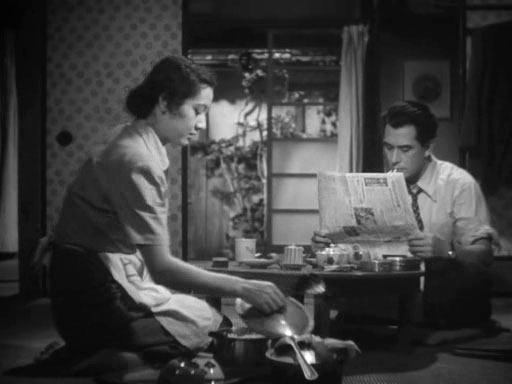
Meshi
Mikio Naruse - 1951
Eureka! The Masters of Cinema Series Region 2 DVD
The upcoming series of Japanese films playing this weekend at the Starz Theater in Denver has provided the perfect impetus to see Mikio Naruse's available films on DVD. I've had both sets from Eureka! and the BFI but hadn't gotten around to seeing anything yet. The festival itself is notable for featuring four Naruse films, with Yearning and Lightning not available on English subtitled DVD, and Flowing available from Eureka! for those of use who disdain region coding. I will have to miss seeing When a Woman Ascends the Stairs theatrically due to a change of scheduling, but am more disappointed that I can't meet with David Desser, author of Eros Plus Massacre: An Introduction to the Japanese New Wave Cinema. In addition to seeing three of the four films by Naruse, I will also be seeing House, a film heartily recommended by fellow bloggers Dennis Cozzalio and Bob Turnbull. I will also see, but might not write about, Millennium Actress, seen previously on DVD. I'm not big fan of anime, but after seeing Paprika theatrically three years ago, it seemed to me that I should revisit this film on a movie screen.
I have slowly been reading Catherine Russell's book on Naruse. An important point is that Naruse's films were made and marketed for a general audience in Japan. With the distances created by time, geography and culture, Russell's book has been quite helpful in knowing what to look for in those aspects of his films that might be misunderstood or passed over.
Given the meaning of the English language title, food is a significant part of the film. The opening scene is of a breakfast meal, Michiyo preparing breakfast for husband Hatsu, as well as a bowl of milk for her pet cat, Yuri. An older woman comes by, selling rice door to door in this older, run down area outside of Osaka. Michiyo comments that the rice she has prepared smells funny. For Hatsu, Michiyo's most important function is to provide him with his breakfast and dinners, with the frequent declaration that he is starving. Michiyo's high points outside of the house include a cup of coffee at a cafe, and rice cooked by her mother in Tokyo.
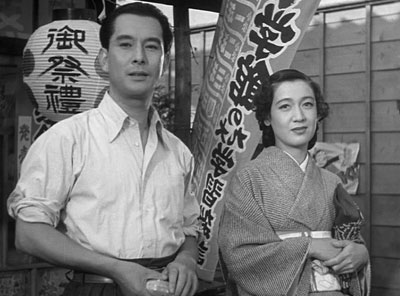
Taken from a novel by Fumiko Hayashi, the film chronicles Michiyo's discontent with married life. The "man of her dreams" barely converses with her, more involved with his newspaper in the morning. Married life consists of a routine of cooking, cleaning and other household chores. Michiyo and Hatsu show more feeling for each other when there is distance, when unseen by each other, but seen by the audience, the two laugh and smile during a telephone conversation. Whatever vestiges of affection the couple have are almost lost to boredom and routine.
Clothes are important markers of class or authority. Hatsu wears a relatively nice suit for his job at a brokerage, marked by his possession of some expensive looking two-tone shoes. Michiyo is usually dressed in a plain white blouse and solid skirt, contemporary but anonymous. A collision of styles is evident in one scene with four women - Michiyo, a neighbor in a traditional kimono, a woman who runs a small bar supported by a "patron", dressed in a more colorful kimono, and Hatsu's young neice, Satoko, in an outfit that might be described as futuristic in style. A neighborhood boy is first seen wearing a zoot suit. Michiyo frets about what she will wear for a reunion with some former classmates. Taking place in 1951, after the defeat of World War II, but a few years before the boom years, someone in the neighborhood has stolen shoes.
Hatsu's flirting with the young and pretty Satoko is mirrored by Michiyo's infatuation with her cousin, Kazuo. The film is about a balancing act between the traditional and the modern ways of being, with happiness seemingly understood by many of the main characters as being something always beyond reach due to money, societal expectations, or some other inner or outer force. The ending provides just enough ambiguity to suggest that while the grass might be greener on the other side, there might be something to appreciate with what one has, no matter how modest, or possibly that one is setting themselves up for disappointment by looking for more, be it love, money or simply some form of validation.
The final shot, which includes one woman stooping over a basin, doing laundry by hand, probably dissuaded a few young women from marriage, or least tossed out the romantic notions of a blissful future. The scenes shot on the streets of Osaka and Tokyo help give a portrait of a part of Japan during the years following World War II. One woman still hopes that her missing husband, perhaps a P.O.W., will return home. At a time when more Japanese women were by choice or circumstances having to support themselves, Satuko looks into being an office girl, while Machiyo toys with the idea of finding a job in Tokyo. Setsuko Hara's Michiyo doesn't suffer the way she does in a film by Ozu, or even Kurosawa's No Regrets for Our Youth. There is a certain amount of self-perspective when she tells Hatsu, played by Ken Uehara, that she has frittered away 2500 yen. Even when the characters revert to the familiarity of a life dictated by tradition, they find some small comfort in acknowledging the existence of other possibilities.
Posted by Peter Nellhaus at 12:35 AM
April 04, 2010
Coffee Break

Barry Kelley and Sam Levene in Boomerang! (Elia Kazan - 1947)
Posted by Peter Nellhaus at 12:10 AM
April 01, 2010
Monster X Strikes Back: Attack the G-8 Summit

Girara no gyakushu: Toya-ko Samitto kikiippatsu
Minoru Kawasaki - 2008
Media Blasters Region 1 DVD
Minoru Kawasaki's film not only works more or less simultaneously as a parody and homage of Japanese monster movies, but is quite easily a better made film than many of its sources of inspiration. While the original Monster X, known as Girara in the Japanese version and Guilala in the English language version, was made by rival studio Shochiku, the story uses the same template established by Toho studios. The main characters are a newspaper reporter and a photographer, there's a group of people living in a remote area who worship an ancient god, there the connection between a monster and a young boy, and there's the boy in a baseball cap who manages to sneak into an off limits facility. The villagers also have some kind of group dance as part of their rituals. Add to this, Kawaski's own penchant for making fun Japanese culture as well as the pomposity of political leaders. It is somewhat disconcerting that for a filmmaker who virtually celebrates his own cheapness, this may be the most polished and best looking film from Kawasaki.
The leaders of the industrial world have gathered in northern Japan to discuss the environment. Whatever jockeying for influence is put aside with the news that a monster has invaded Japan. Rather than scurrying home, the President of the United States declares that the best thing would be for him to stay to fight the monster. The other leaders, realizing the political advantage, follow suit. Japan, Italy, Russia, Germany and Great Britain each come up with ideas to defeat Guilala. Each attempt ends in failure, with the monster emerging even stronger. The only foe that can defeat Guilala is the god, Take-majin, who exists as a mythical character.

Guilala creates havoc, busting through buildings that look no more real than the sets of similar films from forty years ago, breathing fire, and literally laughing at the failed attempts to kill him. Some of the more topical humor includes a Japanese prime minister with very audible irritable bowel syndrome, a French prime minister more interested in bedding his attractive translator, and a dictator from a place identified at the North Country, recognizable to anyone who has seen Team America. Kawasaki doesn't spare his own film by having one of his artist friends, interviewed on television, commenting that while it's good to see Guilala back in action, he would have preferred an attack by Varan or Baragon.
I have to wonder if Kawasaki has worked himself into an artistic corner. While Monster X Strikes Back is fun to watch, it does eventually get almost as tiresome as many of the later Japanese monster movies tend to do after the first hour or sometimes less. For myself, Kawasaki's best films are The Calamari Wrestler, about a talking octopus who is a professional wrestler, and Rug Cop, about a policeman who overcomes the bad guys by flinging his toupee. Less successful for me are the more ambitious Executive Koala and The World Sinks . . . except Japan. A Youtube glimpse at the film, Pussy Soup, featuring puppets, with a cat who cooks ramen, offers little promise of anything new. Even though Monster X Strikes Back doesn't offer some of the laughs of Kawasaki's best films, there is still pleasure to be had with the reassuring voice of Beat Takeshi as the saviour of the world, and the sight of the monster itself doing a little victory dance in the sunset.

Posted by Peter Nellhaus at 12:36 AM